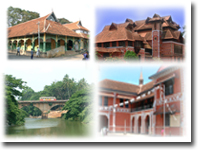 |
Life and Times |
| Swathi Thirunal:Early childhood | |
| Swathi Thirunal as a patron of art | |
| Swathi Thirunal as an able administrator |
Swathi Thirunal as an Able Administrator
 |
Maharaja
Swathi Thirunal’s reign was a period of transition. The state
of Travancore was steadily losing its independence to the growing power
of the British Empire. More and more of the administrative powers were
abrogated by the British Resident. To the Maharaja who inherited the
proud traditions of one of the oldest royal families in India, the British
interference was almost intolerable. |
His spirit of freedom struggled in vain before the hegemonic British power, till his death in 1847.Inspired by the highest ideals of the Dharma Sastra and motivated by the welfare of the people, his ambition was to build upon the foundations laid by his illustrious ancestors and enhance the prosperity of the State in a manner worthy of the traditions and suited to the conditions of his time. A great scholar and linguist endowed with rare artistic gifts, he was passionately devoted to arts and letters, but he always remembered that his first and foremost duty as Sri Padmanabha Dasa was to look after the affairs of the State and promote the well-being of his subjects. During the period of his mother Lakshmi Bai and his aunt Parvathi Bai, there was a change in the nature of administrative pattern, by which Colonel Munro combined in him the roles of the British Resident and the Dewan. Even then, the Administration under the able Colonel was notable for its efficiency. Steeped in Indian tradition and at the same time fully acquainted with the ideals and ideas of the West, Swathi Thirunal wanted to give the benefits of the best features of both the systems to his people and maintain efficient administrative system. The first act of the Maharaja as an administrator was to shift the Huzur Cutcherry (Secretariat) and other public offices from Kollam to Thiruvananthapuram with a view to securing more effective control in the discharge of official business. He also devoted personal attention in the transaction of all important affairs of State and kept a vigilant watch over the progress in the various departments. Reorganization and modernization of judiciary by the establishment of Munsiff courts, Zillah courts and an Appeal court at the capital was one of the early measures introduced by the Maharaja to improve the efficiency of judicial service in the state. The promulgation of a new code of regulations in 1835 on the British Indian model was another step in the same direction. The educational policy of the Maharaja shows him to be a far-sighted administrator. He laid the foundation of modern education in the State by establishing English schools and by offering employment to those having knowledge of that language. He realized that the prosperity of an agricultural country like Travancore depended on an efficient land revenue policy coupled with adequate facilities for transport and irrigation. The survey of the paddy lands of the state undertaken by the Government in 1837 (1012 M.E.) was one of the most beneficial measures to improve the loss of the tenants and cultivators. The land records prepared during that survey are valuable documents in deciding disputes and questions relating to landed properties even to this day. The organization of an engineering department with a special irrigation section at Nanjinad bears testimony to the Maharaja’s commitment to infrastructure building. He was equally interested in promoting trade as may be seen from the abolition of minor duties on more than 160 articles. Several important institutions came into existence due to the personal interest of the Maharaja, and some of them like the Trivandrum Observatory, the Museum & Zoo, the Government Press, the State Library etc. These institutions in Thiruvananthapuram have developed into premier institutions of the State. The charity hospital founded by him at Thiruvananthapuram laid the foundation for the Allopathic system of medical treatment in Travancore. These as well as several other measures adopted by him, show the keen interests he took in the administration of the State with a view to promoting all-round prosperity and advancement of the people. The importance he attached to his role as a ruler may be clearly seen from his attitude to the British Resident, General Cullen, who interfered with the administration, as well as from his dealings with corrupt officers. His relationships with General Cullen form a tragic episode in our history. Had the Maharaja been a weak ruler, content to abide by the directions of the representative of the imperial power, his life would have been far happier. But he appears to have had such a high sense of duty and self-respect as not to yield to unwarranted intervention. A man of the highest principles and character, he could not brook any delinquency or corrupt practice. The dismissal of Dewan Subha Rao from service furnishes a convincing example. Rao was the tutor of the Maharaja before he became the Dewan, but that relationship did not prevent the Maharaja from removing him from service when charges of corruption were leveled against him. It is particularly to be noted that the Maharaja did not change his mind even after a committee of enquiry exonerated the Dewan from the charges. Several other officers also met with the same treatment at the Maharaja’s hand. He set his face sternly against any kind of nepotism and favoritism, which spoiled the administration. When Dewan Reddy Rao appointed two of his sons in his office against a specific warning given to him, the Maharaja dismissed them. Reddy Rao himself was asked to render his resignation or to submit himself to a public enquiry when he was accused of having accepted bribery. These are a few among the numerous instances revealing his high sense of public morality and purity of administration.
Although the Maharaja’s title to permanent fame, from the modern
point of view, rests more on his contribution as a composer and a patron
of arts and letters, his greatness as an administrator deserves grateful
recognition. He was a scholar, musician and poet, but by birth and temperament
he was every inch a king who never forgot the dignity of his position
and was ever anxious to discharge his sacred duties as Sri Padmanabha
Dasa, Servant of Lord Padmanabha, the presiding deity of the Travancore
royal house. |

